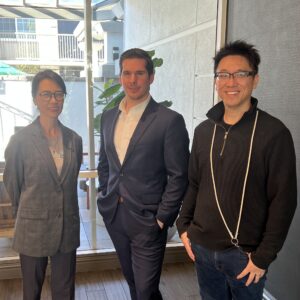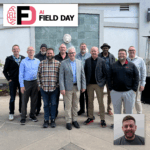|
|
 Maggie Wu, Max Zeumer, and Keith Choi presented for Fortinet at AI Field Day 7 |
This Presentation date is October 29, 2025 at 13:30-15:00.
Presenters: Keith Choi, Maggie Wu, Max Zeumer
Ready to move beyond the theory and see AI in security action? Join Fortinet at AI Field Day for a deep dive into our practical AI strategy. We’ll showcase FortiAI with live demos, demonstrating how we protect against AI-powered threats, secure your AI infrastructure and data, and leverage AI to automate and simplify your security and network operations. Learn how Fortinet enables businesses to securely use AI and defend their networks in a highly intelligent, highly integrated, and highly autonomous way.
Empower Innovation with AI Secured by Fortinet Fabric
Watch on YouTube
Watch on Vimeo
In his presentation at AI Field Day 7, Max Zeumer from Fortinet discussed how the rapid adoption of generative AI has transformed the threat landscape and the imperative for organizations to secure their AI usage. He began by highlighting the explosive growth of generative AI compared to past technologies, stressing that enterprises must adapt quickly to its integration. While some organizations are implementing AI in a structured way with governance and compliance, most are still in the early stages and lack visibility and control, which introduces significant risk. Zeumer noted that as AI progresses from reactive prompt-based tools to agentic and autonomous systems, enterprises face mounting challenges to secure data, manage usage, and maintain compliance.
Zeumer emphasized that quickly evolving AI tools also present new vulnerabilities in the cybersecurity space. Threat actors have begun using AI to create convincing phishing attacks, social engineering campaigns, and malware, often lowering the technical barrier for carrying out sophisticated cyberattacks. In addition, internal risks were discussed, such as employees unknowingly feeding sensitive company data into public AI platforms. This lack of governance can lead to data leakage and regulatory breaches. Fortinet sees a growing need for enterprises to monitor the various applications of AI within their organizations, understand who is using it, how, and what data is being processed, especially as adversaries increasingly employ AI in weaponized forms.
To address these emerging concerns, Fortinet has developed a comprehensive AI-integrated cybersecurity framework called Fortinet Security Fabric, powered by its proprietary AI platform, FortiAI. This system is structured around three main pillars—FortiAI Protect, Assist, and Secure AI—covering threat detection and prevention, operational augmentation, and safeguarding AI systems themselves. FortiGuard Labs plays a fundamental role by continuously collecting sophisticated threat intelligence and feeding it into these systems. This allows customers to receive accurate, real-time insights, manage risk from generative AI applications, and set governance rules. Fortinet’s unified platform and deep AI capabilities, backed by over 500 patents and years of innovation, position it to help enterprises adopt AI securely while maintaining performance and compliance.
Personnel: Max Zeumer
Work Smarter Than Harder FortiAI-Assist from Fortinet
Watch on YouTube
Watch on Vimeo
At AI Field Day 7, Fortinet presented its FortiAI Assist technology, emphasizing its integration across the Fortinet Security Operations Center (SOC) platform. Max Zeumer, the speaker, highlighted the growing burden on security teams dealing with massive volumes of alerts and limited personnel. FortiAI Assist was designed to alleviate this pain by embedding AI-driven support directly into the SOC interface. The AI assistant can efficiently prioritize alerts, triage investigations, and enrich incident details using available threat intelligence and telemetry. Analysts can interact with FortiAI Assist via typed or spoken queries, enabling them to focus on higher-level strategic decisions while the AI handles data gathering and analysis. Additionally, Fortinet employs a blend of generative AI and pre-built playbooks to orchestrate actions like isolating compromised hosts and compiling incident reports while maintaining a “human-in-the-loop” model for oversight.
Beyond SOC capabilities, FortiAI Assist also extends to Network Operations Centers (NOC), as described by Maggie Wu during her portion of the presentation. In the NOC context, FortiAI aims to simplify and expedite day-one deployment tasks, such as auto-generating configurations from topology diagrams and validating configuration scripts. Day-two operations are boosted by real-time network health assessments, troubleshooting, and suggested fixes, all guided through AI-driven dialogue with the admin. The AI assistant is capable of identifying root causes—like VPN or Wi-Fi failures—and proposing remediations that can be executed upon user confirmation. The technology allows customizable interaction levels so that organizations can maintain compliance with their change management processes.
Fortinet also addressed the flexibility of FortiAI Assist within both Fortinet-exclusive and multi-vendor environments. While native Fortinet deployments offer full capabilities with deep cross-platform interoperability, approximately 80-90% of AI-based functionality is available in broader ecosystems thanks to comprehensive APIs and collaborative integrations with over 500 partners. Organizations can build or customize their own automation connectors, reinforcing Fortinet’s commitment to open systems and vendor interoperability. Furthermore, FortiAI Assist supports scalable adoption strategies, offering options such as detailed change plans and rollback capabilities, enabling organizations to gain trust gradually through staged automation. Fortinet envisions a future where its AI agents collaborate with partner AI solutions, creating a cohesive and intelligent security and network management ecosystem.
Personnel: Max Zeumer
Secure AI Conversation, Not Just the Data, with Fortinet
Watch on YouTube
Watch on Vimeo
In Fortinet’s presentation at AI Field Day 7, Maggie Wu emphasized how the emergence of AI applications has radically altered the cybersecurity landscape, moving beyond traditional web security into more dynamic, conversation-driven AI interactions. The company’s approach integrates threat intelligence from FortiGuard Labs into their systems, providing real-time insights and protection across network environments. Their AI models, developed and maintained within Fortinet’s infrastructure, are further tailored to customer environments by mapping incoming AI interactions to localized context, ensuring outputs are relevant and secure for specific clients. Fortinet utilizes public LLMs for basic interactions while incorporating customer-specific data locally to avoid unnecessary exposure.
Wu elaborated on a multi-layered strategy to secure not just data, but also the AI-driven conversations themselves. Recognizing that modern AI systems are vulnerable to prompt injection, data leakage, and model poisoning, Fortinet introduced an AI orchestration layer and a set of protections designed to sanitize both AI inputs and outputs. AI infrastructure is continuously scanned for vulnerabilities, and user/environment-based access controls are enforced rigorously. They have also integrated security into their CI/CD pipelines, ensuring that AI models are secure even before deployment. This multi-faceted approach helps prevent security flaws from being exploited during any stage of the AI lifecycle.
Fortinet differentiates its offering from competitors by embedding AI capabilities directly into its existing unified platform rather than creating separate AI products. This integration enables smarter, context-aware automation across Fortinet’s entire ecosystem of security, networking, SOC, and SASE solutions. While optimal performance is achieved within a Fortinet-centric infrastructure, the company also supports multi-vendor environments by offering modular add-ons like FortiAI Assist, which can integrate with third-party SIEM and SOAR platforms. Their AI governance model includes comprehensive tracking and compliance monitoring of LLM interactions, supporting enterprise needs for regulatory adherence and ethical AI use.
Personnel: Maggie Wu
Security Using AI with Fortinet
Watch on YouTube
Watch on Vimeo
At AI Field Day 7, Keith Choi from Fortinet presented an overview of Fortinet’s AI strategy and portfolio, emphasizing the integration of AI within cybersecurity solutions. He explained that the increasing adoption of AI in enterprises is driven by the need for efficiency and innovation, and Fortinet has developed a layered approach categorized into three buckets: Protect AI, Secure AI, and AI-Assisted Operations. These categories are designed to address different aspects of AI-related security, from defending against AI-driven threats, to securing AI systems themselves, and enhancing operational efficiency through AI-powered tools like SOC and NOC support.
Choi detailed various solutions underpinning Fortinet’s AI capabilities. For example, FortiGate, the company’s next-generation firewall, now includes controls for generative AI applications, allowing administrators to manage access and prevent data loss. Meanwhile, FortiNDR provides deep network detection and response capabilities without affecting throughput, acting as an internal magnifying tool to monitor and detect threats. FortiDLP complements these tools by offering endpoint data loss protection with real-time alerts and monitoring, helping organizations prevent sensitive data from leaking through AI platforms like ChatGPT. These tools illustrate Fortinet’s commitment to using AI not only to protect networks but also to secure how AI itself is used within organizations.
The presentation concluded with insights into AI-Driven operational tools like FortiAI Assist, which uses generative AI for troubleshooting and management through an interactive chatbot UI. Choi highlighted that Fortinet’s architecture uses region-specific AI proxies, ensures sensitive data masking, and allows deployment flexibility between on-premises and cloud environments depending on client needs. He reinforced the message that AI security solutions need to be architected based on specific organizational requirements, not delivered as a one-size-fits-all model. Fortinet’s approach, with heavy emphasis on secure architecture and user training, positions them as a versatile partner in navigating AI’s growing footprint in enterprise environments.
Personnel: Keith Choi









